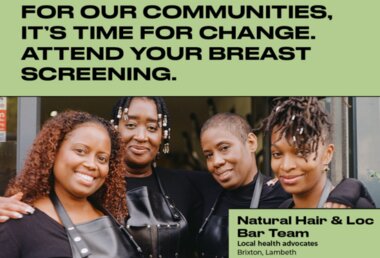Improving early cancer diagnosis for the Black community
Today, one in four Black men will get prostate cancer, and one in 12 will die from the disease. Black women are twice as likely to get diagnosed with breast cancer when it is at a later stage and harder to treat.
This needs to change.
 The South East London Cancer Alliance (SELCA) is committed to tackling these inequalities and improving the health outcomes of the many lives affected by cancer.
The South East London Cancer Alliance (SELCA) is committed to tackling these inequalities and improving the health outcomes of the many lives affected by cancer.
Working with its Black communities, SELCA has launched a campaign to encourage all Black women, 50 to 70 to attend their breast cancer screening appointment when invited.
The cancer alliance is also encouraging all Black men aged 45 and over to ask their GP Practice for a PSA Blood test. A PSA blood test involves taking a blood sample from the arm, and it can help identify if you need to be sent to hospital for further tests for prostate cancer.
One in two people today will get cancer, it’s that common. However, more people than ever are surviving following treatment and going on to enjoy their lives.
Early detection and treatment of cancer is vital in helping people to live longer and healthier lives.
Who can request a PSA blood test and who’s invited for breast cancer screening?
PSA blood test to identify prostate cancer
Black men have a one in four chance of getting prostate cancer, and it’s one in eight for white men.
While there is a lot of work being done globally to understand these differences, SELCA is committed to reducing the impact of prostate cancer on our Black communities.
GP practices across south London are aware of the campaign, and ready to book Black men aged 45 or over for a PSA blood test. However, if your practice isn’t aware of the campaign, please draw their attention to this website.
You can also find out more about the PSA blood test here.
Based on your results, your GP will advise you on next steps, including when next you need to book another PSA blood test.
Breast cancer screening
All women between the ages of 50 to 70 will receive a letter every three years inviting them for their NHS breast cancer screening. It is a routine screening that millions of women attend to help identify signs of breast cancer, alongside routinely self-examining their breasts.
You can find out more about what to expect at a breast cancer screening appointment here.
Learn more about the work of SELCA.